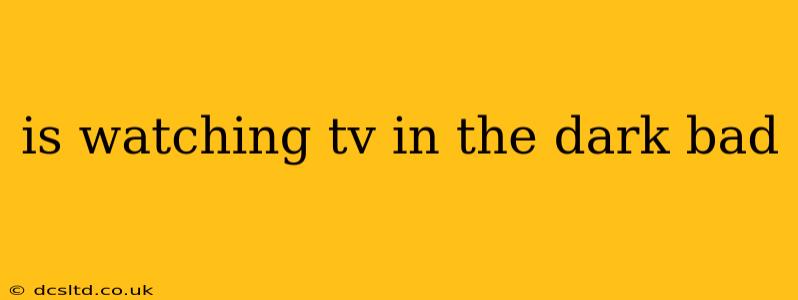Is Watching TV in the Dark Bad for Your Eyes?
Watching TV in the dark is a common habit, but is it harmful to your eyes? The short answer is: it depends. While it's not likely to cause permanent damage, prolonged periods of watching TV in complete darkness can contribute to eye strain, headaches, and potentially worsen pre-existing conditions. Let's delve deeper into the potential risks and what you can do to mitigate them.
Can Watching TV in the Dark Damage Your Eyesight?
No, watching TV in the dark won't directly damage your eyesight in the way that, say, staring at the sun would. However, it can significantly increase eye strain and discomfort. Your eyes work harder to adjust to the contrast between the bright screen and the surrounding darkness. This continuous effort can lead to fatigue, headaches, and blurry vision. For those with pre-existing eye conditions like dry eyes or nearsightedness, watching TV in the dark can exacerbate these issues.
What are the effects of watching TV in the dark?
The primary effect of watching TV in the dark is eye strain. This happens because your pupils dilate in the dark to let in more light, but the bright screen light then causes them to constrict repeatedly. This constant dilation and constriction can lead to eye fatigue, headaches, and even temporary blurry vision. The added strain can also worsen existing eye problems like dry eyes or astigmatism.
Does watching TV in the dark cause headaches?
Yes, eye strain from watching TV in the dark is a common trigger for headaches, especially tension headaches. The constant focusing and adjusting your eyes make for tired eye muscles, which can lead to the pain radiating to your temples and forehead.
How can I watch TV without hurting my eyes?
To minimize the negative effects of watching TV in the dark, consider these simple steps:
- Dim the lights, don't extinguish them completely: A dimly lit room provides enough ambient light to reduce the strain on your eyes. Avoid complete darkness.
- Adjust screen brightness: Lowering the brightness of your TV screen can significantly reduce eye strain.
- Take frequent breaks: The 20-20-20 rule is helpful: every 20 minutes, look at something 20 feet away for 20 seconds. This allows your eyes to rest.
- Maintain proper viewing distance: Sit at an appropriate distance from your screen to prevent eye strain.
- Consider using blue light glasses: Blue light emitted from screens can contribute to eye fatigue. Blue light glasses can help filter out some of this harmful light.
Is it better to watch TV in the dark or light?
It's unequivocally better to watch TV in a dimly lit room rather than complete darkness. A softly lit environment reduces the strain on your eyes and prevents the constant adjustments your pupils must make in total darkness.
What should I do if I experience eye pain after watching TV in the dark?
If you experience persistent eye pain, redness, or blurry vision after watching TV in the dark, it's best to consult an ophthalmologist or optometrist. They can assess your eye health and determine if any underlying conditions are contributing to your discomfort.
By following these simple precautions, you can enjoy your favorite shows without compromising your eye health. Remember, moderation is key – even with proper lighting, prolonged screen time can be detrimental. Prioritizing eye health is crucial for maintaining long-term vision.
